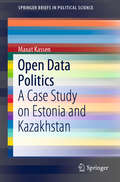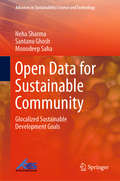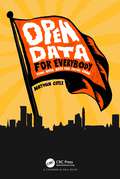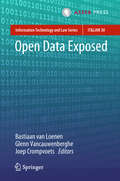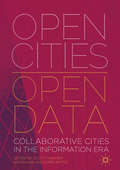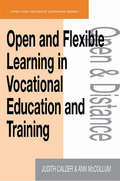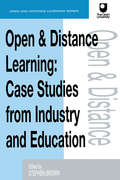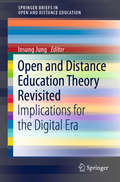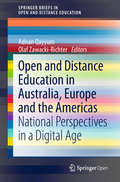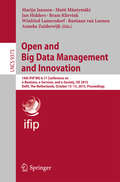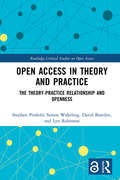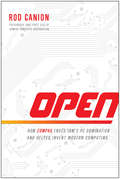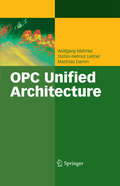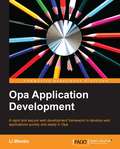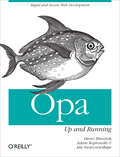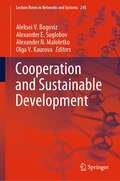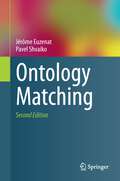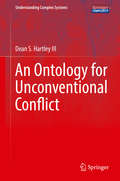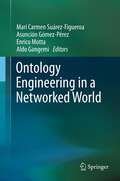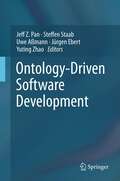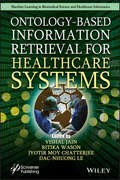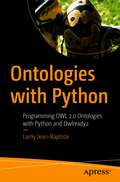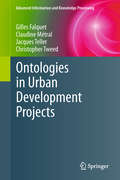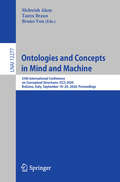- Table View
- List View
Open Data Politics: A Case Study on Estonia and Kazakhstan (SpringerBriefs in Political Science)
by Maxat KassenThis book offers a cross-national comparison of open data policies in Estonia and Kazakhstan. By analyzing a broad range of open data-driven projects and startups in both countries, it reveals the potential that open data phenomena hold with regard to promoting public sector innovations. The book addresses various political and socioeconomic contexts in these two transitional societies, and reviews the strategies and tactics adopted by policymakers and stakeholders to identify drivers of and obstacles to the implementation of open data innovations. Given its scope, the book will appeal to scholars, policymakers, e-government practitioners and open data entrepreneurs interested in implementing and evaluating open data-driven public sector projects.
Open Data for Sustainable Community: Glocalized Sustainable Development Goals (Advances in Sustainability Science and Technology)
by Neha Sharma Santanu Ghosh Monodeep SahaThis book is an attempt to bring value to the enterprise pursuits in the areas of research and innovation around the specific issues in terms of topic selection, open data resources and researcher orientation. Over the last 300 years, industrial revolutions have had game-changing impact on societies. Presently, by and large, we are at the crossroads of the fourth industrial revolution, where phygital systems are going to play a massive role, where digital systems can simulate and go beyond the limitations of the physical world, thereby enabling a new world order. This transformation is cutting across every sphere known to mankind. The world will become a globally localized marketplace. In today’s business world, sustainability is a corporate agenda. Enterprises are also aiming to be purpose-driven, adaptive and resilient to disruptions. The contributions to community and environment are part of their corporate branding. The book explores and presents a part of the open data sets from government institutions to achieve the sustainable goals at local level, in turn contributing towards global mission. As the topic suggests, the authors are looking at some of the specific issues in the areas of environment, agriculture and health care through the lens of data science. The authors believe that the above three areas chosen have deep relevance in today’s world. The intent is to explore these issues from a data and analytics perspective and identify cracks through which deeper inroads can be made. Conscious efforts have been taken to make use of all the major data science techniques like prediction, classification, clustering, and correlation. Given the above background, deeper waters will be explored through the contents of this book.
Open Data for Everybody: Using Open Data for Social Good
by Nathan CoyleWhat if I told you something that could empower our third sector and activists to enhance their capacity? From gathering evidence for funding tenders to campaigning for crucial social issues and much more? It's called open data, yet many in social action remain unaware of it. Primarily shaped by corporate entities, open data seems tailored only for technologists, alienating the third sector. But in reality, it's a powerful tool for social change, bolstering civil society, and creating resilient communities.This book argues a simple point: if open data and the digital aspects that support it aren't accessible to all, then what is the point of it? In an age where technology should be seen as a fundamental human right, it's time to rethink outreach. Deeply rooted in grassroots social activism, this book explores a journey that led to collaborations with governments globally, based on real hands-on work, aiming to democratize open data. Through narrative storytelling, we share insights, best practices, procedures, and community-driven approaches. Regardless of your skill set or organization size, from grassroots workers to third-sector professionals and government officers, join us to reshape the perception of open data, fostering change in neighborhoods.Open Data for Everybody: Using Open Data for Social Good is a love letter to open data's transformative power. To create solutions, understanding the problem is crucial. This book seeks to return control to the real experts—those living and working within our communities.
Open Data Exposed (Information Technology and Law Series #30)
by Bastiaan Van Loenen Glenn Vancauwenberghe Joep CrompvoetsThe main objectives of this book are to expose key aspects that have a relevance when dealing with open data viewed from different perspectives and to provide appealing examples of how open data is implemented worldwide.The concept of open data as we know it today is the result of many different initiatives, both of a legislative and non-legislative nature, and promoted by a wide range of actors. Numerous regulatory antecedents to foster the concept of open data and embed it in national and international policy agendas have been undertaken on both sides of the Atlantic, as well as at a supranational level. The book highlights a number of the efforts made to promote open data in Europe, Asia and the United States. In addition to new insights, practical guidance and multiple disciplinary perspectives on open data, the book also addresses the transformation of current developments towards open data, which may be referred to as the democratisation of data. This book will support open data practitioners as well as open data scholars in their endeavours to promote open data implementation and research.Bastiaan van Loenen is associate professor and director of the Knowledge Centre Open Data at the Faculty of Architecture and The Built Environment of Delft University of Technology in the Netherlands, as is Glenn Vancauwenberghe, who is a post-doctoral researcher, and Joep Crompvoets is a professor at the Public Governance Institute of the KU Leuven in Belgium.
Open Cities | Open Data: Collaborative Cities in the Information Era
by Hoon Han Scott Hawken Christopher PetitToday the world’s largest economies and corporations trade in data and its products to generate value in new disruptive markets. Within these markets vast streams of data are often inaccessible or untapped and controlled by powerful monopolies. Counter to this exclusive use of data is a promising world-wide “open-data” movement, promoting freely accessible information to share, reuse and redistribute. The provision and application of open data has enormous potential to transform exclusive, technocratic “smart cities” into inclusive and responsive “open-cities”.This book argues that those who contribute urban data should benefit from its production. Like the city itself, the information landscape is a public asset produced through collective effort, attention, and resources. People produce data through their engagement with the city, creating digital footprints through social medial, mobility applications, and city sensors. By opening up data there is potential to generate greater value by supporting unforeseen collaborations, spontaneous urban innovations and solutions, and improved decision-making insights. Yet achieving more open cities is made challenging by conflicting desires for urban anonymity, sociability, privacy and transparency. This book engages with these issues through a variety of critical perspectives, and presents strategies, tools and case studies that enable this transformation.
Open and Flexible Learning in Vocational Education and Training (Open and Flexible Learning Series)
by Judith Calder Ann McCollumThis text reviews the strategies adopted in a range of behaviourist approaches to the setting and realization of standards - identifying the background from which they emerged and ways in which they might be further developed.
Open and Distance Learning: Case Studies from Education Industry and Commerce (Open And Distance Learning Ser.)
by Stephen BrownThis contributed volume reviews the lessons that may be learned from trying to integrate distance learning strategies with face-to-face teaching methods. It contains practical examples from education, commerce and industry.
Open and Distance Education Theory Revisited: Implications for the Digital Era (SpringerBriefs in Education)
by Insung JungThis book explores foundational theories that have been applied in open and distance education (ODE) research and refined to reflect advances in research and practice. In addition, it develops new theories emerging from recent developments in ODE. The book provides a unique and up-to-date source of information for ODE scholars and graduate students, enabling them to make sense of essential theory, research and practice in their field, and to comprehend the gaps in, and need for further enquiry into, theoretical approaches in the digital era. It also offers theory-based advice and guidelines for practitioners, helping them make and justify decisions and actions concerning the development, implementation, research and evaluation of ODE.
Open and Distance Education in Australia, Europe and the Americas: National Perspectives in a Digital Age (SpringerBriefs in Education)
by Olaf Zawacki-Richter Adnan QayyumThis book is open access under a CC BY 4.0 license.This book describes the history, structure and institutions of open and distance education in six countries: Australia, Brazil, Canada, Germany, the UK and the US. It discusses how open and distance education is evolving in a digital age to reflect the needs and circumstances of national higher education systems in these countries, and explores the similarities and differences between the ways in which they are organized and structured. It is the first book to make such comparisons and draw conclusions about the nature of open and distance education in the context of various national higher education systems. In a digital era with growing use of online education as well as open and distance education, this book is particularly useful for policy-makers and senior administrators who want to learn about organizing and expanding open and distance education provision. It is also a valuable reference for researchers, academics and students interested in understanding the different approaches to open and distance education.
Open and Big Data Management and Innovation
by Anneke Zuiderwijk Bastiaan Van Loenen Winfried Lamersdorf Bram Klievink Jan Hidders Matti Mäntymäki Marijn JanssenThis book constitutes the refereed conference proceedings of the 14th IFIP WG 6. 11 Conference on e-Business, e-Services and e-Society, I3E 2015, held in Delft, The Netherlands, in October 2015. The 40 revised full papers presented together with 1 keynote panel were carefully reviewed and selected from 65 submissions. They are organized in the following topical sections: adoption; big and open data; e-business, e-services,, and e-society; and witness workshop.
Open-Advice
by Lydia PintscherOpen Advice is a knowledge collection from a wide variety of Free Software projects. It answers the question what 42 prominent contributors would have liked to know when they started so you can get a head-start no matter how and where you contribute.
Open Access in Theory and Practice: The Theory-Practice Relationship and Openness (Routledge Critical Studies on Open Access)
by Stephen Pinfield Simon Wakeling David Bawden Lyn RobinsonOpen Access in Theory and Practice investigates the theory-practice relationship in the domain of open access publication and dissemination of research outputs. Drawing on detailed analysis of the literature and current practice in OA, as well as data collected in detailed interviews with practitioners, policymakers, and researchers, the book discusses what constitutes ‘theory’, and how the role of theory is perceived by both theorists and practitioners. Exploring the ways theory and practice have interacted in the development of OA, the authors discuss what this reveals about the nature of the OA phenomenon itself and the theory-practice relationship. Open Access in Theory and Practice contributes to a better understanding of OA and, as such, should be of great interest to academics, researchers, and students working in the fields of information science, publishing studies, science communication, higher education policy, business, and economics. The book also makes an important contribution to the debate of the relationship between theory and practice in information science, and more widely across different fields of the social sciences and humanities
Open: How Compaq Ended IBM's PC Domination and Helped Invent Modern Computing
by Rod CanionThe story of Compaq is well-known: Three ex-Texas Instruments managers founded Compaq with modest venture funding. Just four years later, Compaq was on the Fortune 500 list, and, two years after that, they had exceeded $1 billion in annual revenue.<P><P> No company had ever achieved these milestones so rapidly.But few know the story behind the story. In 1982, when Compaq was founded, there was no software standardization, so every brand of personal computer required its own unique application software. Just eight years later, compatibility with the open PC standard had become ubiquitous, and it has continued to be for over two decades.This didn't happen by accident. Cofounder and then CEO Rod Canion and his team made a series of risky and daring decisions-often facing criticism and incredulity-that allowed the open PC standard marketplace to thrive and the incredible benefits of open computing to be realized.A never-before-published insider account of Compaq's extraordinary strategies and decisions, Open provides valuable lessons in leadership in times of crisis, management decision-making under the pressure of extraordinary growth, and the power of a unique, pervasive culture.Open tells the incredible story of Compaq's meteoric rise from humble beginnings to become the PC industry leader in just over a decade. Along the way, Compaq helped change the face of computing while establishing the foundation for today's world of tablets and smart phones.
OPC Unified Architecture
by Stefan-Helmut Leitner Wolfgang Mahnke Matthias DammThe OPC Foundation defines standards for online data exchange between automation systems. They address access to current data (OPC DA), alarms and events (OPC A&E) and historical data (OPC HDA). Those standards are successfully applied in industrial automation. The new OPC Unified Architecture (OPC UA) unifies the existing standards and brings them to state-of-the-art technology using service-oriented architecture (SOA). Main advantages of the new standard are: Platform-independent technology allows the deployment of OPC UA beyond current OPC applications only running on Windows-based PC systems. OPC UA can also run on embedded systems as well as Linux / UNIX based enterprise systems. The provided information can be generically modeled and therefore arbitrary information models can be provided using OPC UA. This book gives an easy to understand introduction into OPC UA and explains the concepts of the standard and other relevant topics that are not directly addressed by the standard.
Opa Application Development
by Li WenboIt is a tutorial guide to learning how to use Opa with JavaScript, Nodejs, and MongoDB to develop web applications easily and effectively.If you are a web developer who wants to get started with the Opa framework and build web applications with it? Then this book is for you. Web development experience is assumed and would be helpful.
Opa: Rapid and Secure Web Development
by Henri Binsztok Adam Koprowski Ida Swarczewskaja<p>Want to simplify web development? This hands-on book shows you how to write frontend and backend code simultaneously, using the Opa framework. Opa provides a complete stack for web application development, including a web server, database engine, distribution libraries, and a programming language that compiles to JavaScript.</p>
Сooperation and Sustainable Development (Lecture Notes in Networks and Systems #245)
by Aleksei V. Bogoviz Alexander E. Suglobov Olga V. Kaurova Alexander N. MaloletkoThis book presents a systematic view of the cooperative sector of the economy from the standpoint of sustainable development. On the one hand, the book reveals the consequences of business cooperation for the implementation of global sustainable development goals, primarily in terms of environmental protection and food security. On the other hand, the book defines the essence of sustainable development of the cooperative sector of the economy as a demonstrative economic practice that reflects the general state of socio-economic systems. Scientific, methodological, and applied recommendations for the systemic optimization of the management of the cooperative sector of the economy in the interests of simultaneously achieving its maximum positive impact on the implementation of sustainable development goals, as well as maintaining its stability are proposed.The book contains the best works based on the results of the International Scientific and Practical Conference “Cooperation and Sustainable Development”, which was held on December 15-16, 2020. Its target audience is scientists studying processes of business structures cooperation, business entities carrying out cooperation, as well as public authorities, which will find guidelines for improving state regulation of the cooperative sector of the economy in this book.
Ontology Matching
by Jérôme Euzenat Pavel ShvaikoOntologies tend to be found everywhere. They are viewed as the silver bullet for many applications, such as database integration, peer-to-peer systems, e-commerce, semantic web services, or social networks. However, in open or evolving systems, such as the semantic web, different parties would, in general, adopt different ontologies. Thus, merely using ontologies, like using XML, does not reduce heterogeneity: it just raises heterogeneity problems to a higher level. Euzenat and Shvaiko's book is devoted to ontology matching as a solution to the semantic heterogeneity problem faced by computer systems. Ontology matching aims at finding correspondences between semantically related entities of different ontologies. These correspondences may stand for equivalence as well as other relations, such as consequence, subsumption, or disjointness, between ontology entities. Many different matching solutions have been proposed so far from various viewpoints, e. g. , databases, information systems, and artificial intelligence. The second edition of Ontology Matching has been thoroughly revised and updated to reflect the most recent advances in this quickly developing area, which resulted in more than 150 pages of new content. In particular, the book includes a new chapter dedicated to the methodology for performing ontology matching. It also covers emerging topics, such as data interlinking, ontology partitioning and pruning, context-based matching, matcher tuning, alignment debugging, and user involvement in matching, to mention a few. More than 100 state-of-the-art matching systems and frameworks were reviewed. With Ontology Matching, researchers and practitioners will find a reference book that presents currently available work in a uniform framework. In particular, the work and the techniques presented in this book can be equally applied to database schema matching, catalog integration, XML schema matching and other related problems. The objectives of the book include presenting (i) the state of the art and (ii) the latest research results in ontology matching by providing a systematic and detailed account of matching techniques and matching systems from theoretical, practical and application perspectives.
An Ontology for Unconventional Conflict (Understanding Complex Systems)
by Dean S. HartleyThis book describes the ontology structure, types of actors, their potential actions, and ways that actions can affect the things that are part of the conflict. An ontology of unconventional conflict supports the understanding of unconventional conflict in general. It also provides a tool for understanding and investigating a particular unconventional conflict. The ontology specifies the relations among the elements and supports creating a description of a particular situation. Unconventional conflict spans the range from natural disasters through human disagreements to irregular warfare (up to conventional war). Unconventional conflict involves damage to things and injuries to people; however, the critical factors are the actions, reactions, and opinions of people, including political, military, economic, social, infrastructure, and information components. This ontology supports and will appeal to military strategists, political scientists, economists, and politicians in understanding their planning for, and managing of these conflicts.
Ontology Engineering in a Networked World
by Aldo Gangemi Asunción Gómez-Pérez Enrico Motta Mari Carmen Suárez-FigueroaThe Semantic Web is characterized by the existence of a very large number of distributed semantic resources, which together define a network of ontologies. These ontologies in turn are interlinked through a variety of different meta-relationships such as versioning, inclusion, and many more. This scenario is radically different from the relatively narrow contexts in which ontologies have been traditionally developed and applied, and thus calls for new methods and tools to effectively support the development of novel network-oriented semantic applications. This book by Suárez-Figueroa et al. provides the necessary methodological and technological support for the development and use of ontology networks, which ontology developers need in this distributed environment. After an introduction, in its second part the authors describe the NeOn Methodology framework. The book's third part details the key activities relevant to the ontology engineering life cycle. For each activity, a general introduction, methodological guidelines, and practical examples are provided. The fourth part then presents a detailed overview of the NeOn Toolkit and its plug-ins. Lastly, case studies from the pharmaceutical and the fishery domain round out the work. The book primarily addresses two main audiences: students (and their lecturers) who need a textbook for advanced undergraduate or graduate courses on ontology engineering, and practitioners who need to develop ontologies in particular or Semantic Web-based applications in general. Its educational value is maximized by its structured approach to explaining guidelines and combining them with case studies and numerous examples. The description of the open source NeOn Toolkit provides an additional asset, as it allows readers to easily evaluate and apply the ideas presented.
Ontology-Driven Software Development
by Jeff Z. Pan Jürgen Ebert Steffen Staab Uwe Aßmann Yuting ZhaoThis book is about a significant step forward in software development. It brings state-of-the-art ontology reasoning into mainstream software development and its languages. Ontology Driven Software Development is the essential, comprehensive resource on enabling technologies, consistency checking and process guidance for ontology-driven software development (ODSD). It demonstrates how to apply ontology reasoning in the lifecycle of software development, using current and emerging standards and technologies. You will learn new methodologies and infrastructures, additionally illustrated using detailed industrial case studies. The book will help you: Learn how ontology reasoning allows validations of structure models and key tasks in behavior models.Understand how to develop ODSD guidance engines for important software development activities, such as requirement engineering, domain modeling and process refinement.Become familiar with semantic standards, such as the Web Ontology Language (OWL) and the SPARQL query language.Make use of ontology reasoning, querying and justification techniques to integrate software models and to offer guidance and traceability supports.This book is helpful for undergraduate students and professionals who are interested in studying how ontologies and related semantic reasoning can be applied to the software development process. In addition, itwill also be useful for postgraduate students, professionals and researchers who are going to embark on their research in areas related to ontology or software engineering.
Ontology-Based Information Retrieval for Healthcare Systems
by Vishal Jain Ritika Wason Jyotir Moy Chatterjee Dac-Nhuong LeWith the advancements of semantic web, ontology has become the crucial mechanism for representing concepts in various domains. For research and dispersal of customized healthcare services, a major challenge is to efficiently retrieve and analyze individual patient data from a large volume of heterogeneous data over a long time span. This requirement demands effective ontology-based information retrieval approaches for clinical information systems so that the pertinent information can be mined from large amount of distributed data.This unique and groundbreaking book highlights the key advances in ontology-based information retrieval techniques being applied in the healthcare domain and covers the following areas: Semantic data integration in e-health care systems Keyword-based medical information retrieval Ontology-based query retrieval support for e-health implementation<br style="background-color: transparent; box-sizing: border-box; color: #455464; font-family: " sourcesanspro","helvetica neue","helvetica",arial,sans-serif; font-size: 1
Ontologies with Python: Programming OWL 2.0 Ontologies with Python and Owlready2
by Lamy Jean-BaptisteUse ontologies in Python, with the Owlready2 module developed for ontology-oriented programming. You will start with an introduction and refresher on Python and OWL ontologies. Then, you will dive straight into how to access, create, and modify ontologies in Python. Next, you will move on to an overview of semantic constructs and class properties followed by how to perform automatic reasoning. You will also learn about annotations, multilingual texts, and how to add Python methods to OWL classes and ontologies. Using medical terminologies as well as direct access to RDF triples is also covered. Python is one of the most used programming languages, especially in the biomedical field, and formal ontologies are also widely used. However, there are limited resources for the use of ontologies in Python. Owlready2, downloaded more than 60,000 times, is a response to this problem, and this book is the first one on the topic of using ontologies with Python.What You Will LearnUse Owlready2 to access and modify OWL ontologies in PythonPublish ontologies on dynamic websitesPerform automatic reasoning in PythonUse well-known ontologies, including DBpedia and Gene Ontology, and terminological resources, such as UMLS (Unified Medical Language System)Integrate Python methods in OWL ontologies Who Is This Book ForBeginner to experienced readers from biomedical sciences and artificial intelligence fields would find the book useful.
Ontologies in Urban Development Projects
by Jacques Teller Claudine Métral Christopher Tweed Gilles FalquetOntologies are increasingly recognized as essential tools in information science. Although the concepts are well understood theoretically , the practical implementation of ontologies remains challenging. In this book, researchers in computer science, information systems, ontology engineering, urban planning and design, civil and building engineering, and architecture present an interdisciplinary study of ontology engineering and its application in urban development projects. The first part of the book introduces the general notion of ontology, describing variations in abstraction level, coverage, and formality. It also discusses the use of ontologies to achieve interoperability, and to represent multiple points of view and multilingualism. This is illustrated with examples from the urban domain. The second part is specific to urban development. It covers spatial and geographical knowledge representation, the creation of urban ontologies from various knowledge sources, the interconnection of urban models and the interaction between standards and domain models. The third part presents case studies of the development of ontologies for urban mobility, urban morphological processes, road systems, and cultural heritage. Other cases report on the use of ontologies to solve urban development problems, in construction business models, building regulations and urban regeneration. It concludes with a discussion of key challenges for the future deployment of ontologies in this domain. This book bridges the gap between urban practitioners and computer scientists. As the essence of most urban projects lies in making connections between worldviews, ontology development has an important role to play, in promoting interoperability between data sources, both formal (urban databases, Building Integrated Models, Geographical Information Systems etc.) and less formal (thesauri, text records, web sources etc.). This volume offers a comprehensive introduction to ontology engineering for urban development. It is essential reading for practitioners and ontology designers working in urban development.
Ontologies and Concepts in Mind and Machine: 25th International Conference on Conceptual Structures, ICCS 2020, Bolzano, Italy, September 18–20, 2020, Proceedings (Lecture Notes in Computer Science #12277)
by Mehwish Alam Tanya Braun Bruno YunThis book constitutes the proceedings of the 25th International Conference on Conceptual Structures, ICCS 2020, held in Bolzano, Italy, in September 2020.* The 10 full papers, 5 short papers and 1 poster paper presented were carefully reviewed and selected from 24 submissions. The proceedings also include two keynotes and two tutorials. The papers focus on the representation of and reasoning with conceptual structures in a variety of contexts. The topics of this year's conference range from formal concept analysis to decision making, from machine learning to natural language processing. *The conference was held virtually due to the COVID-19 pandemic.
